情态动词mustcancouldmaymight表推测用法
英语情态动词can、may、must的用法
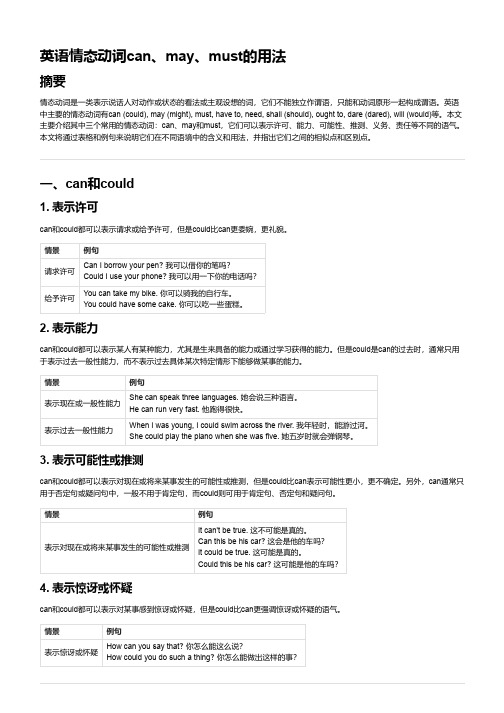
英语情态动词can、may、must的用法摘要情态动词是一类表示说话人对动作或状态的看法或主观设想的词,它们不能独立作谓语,只能和动词原形一起构成谓语。
英语中主要的情态动词有can (could), may (might), must, have to, need, shall (should), ought to, dare (dared), will (would)等。
本文主要介绍其中三个常用的情态动词:can、may和must,它们可以表示许可、能力、可能性、推测、义务、责任等不同的语气。
本文将通过表格和例句来说明它们在不同语境中的含义和用法,并指出它们之间的相似点和区别点。
一、can和could1. 表示许可can和could都可以表示请求或给予许可,但是could比can更委婉,更礼貌。
情景例句请求许可Can I borrow your pen? 我可以借你的笔吗?Could I use your phone? 我可以用一下你的电话吗?给予许可You can take my bike. 你可以骑我的自行车。
You could have some cake. 你可以吃一些蛋糕。
2. 表示能力can和could都可以表示某人有某种能力,尤其是生来具备的能力或通过学习获得的能力。
但是could是can的过去时,通常只用于表示过去一般性能力,而不表示过去具体某次特定情形下能够做某事的能力。
情景例句表示现在或一般性能力She can speak three languages. 她会说三种语言。
He can run very fast. 他跑得很快。
表示过去一般性能力When I was young, I could swim across the river. 我年轻时,能游过河。
She could play the piano when she was five. 她五岁时就会弹钢琴。
3. 表示可能性或推测can和could都可以表示对现在或将来某事发生的可能性或推测,但是could比can表示可能性更小,更不确定。
表示推测的情态动词的用法归纳
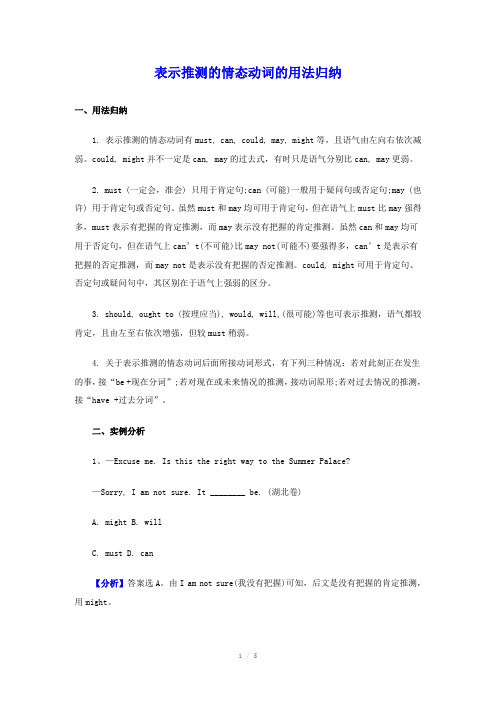
表示推测的情态动词的用法归纳一、用法归纳1. 表示推测的情态动词有must, can, could, may, might等,且语气由左向右依次减弱。
could, might并不一定是can, may的过去式,有时只是语气分别比can, may更弱。
2. must (一定会,准会) 只用于肯定句;can (可能)一般用于疑问句或否定句;may (也许) 用于肯定句或否定句。
虽然must和may均可用于肯定句,但在语气上must比may强得多,must表示有把握的肯定推测,而may表示没有把握的肯定推测。
虽然can和may均可用于否定句,但在语气上can’t(不可能)比may not(可能不)要强得多,can’t是表示有把握的否定推测,而may not是表示没有把握的否定推测。
could, might可用于肯定句、否定句或疑问句中,其区别在于语气上强弱的区分。
3. should, ought to (按理应当), would, will,(很可能)等也可表示推测,语气都较肯定,且由左至右依次增强,但较must稍弱。
4. 关于表示推测的情态动词后面所接动词形式,有下列三种情况:若对此刻正在发生的事,接“be +现在分词”;若对现在或未来情况的推测,接动词原形;若对过去情况的推测,接“have +过去分词”。
二、实例分析1、—Excuse me. Is this the right way to the Summer Palace?—Sorry, I am not sure. It ________ be. (湖北卷)A. mightB. willC. mustD. can【分析】答案选A。
由I am not sure(我没有把握)可知,后文是没有把握的肯定推测,用might。
2、You might just as well tell the manufacturer that male customers ________ not like the design of the furniture. (上海卷)A. mustB. shallC. mayD. need【分析】答案选C。
比较情态动词must, can- could, may- might 用法
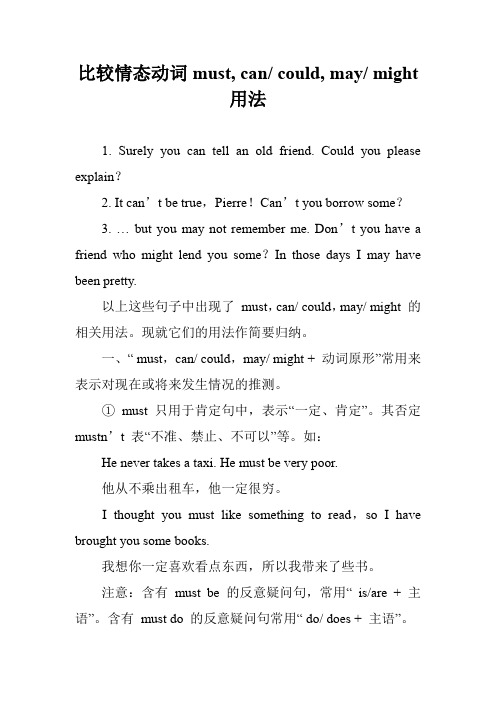
比较情态动词must, can/ could, may/ might用法1. Surely you can tell an old friend. Could you please explain?2. It can’t be true,Pierre!Can’t you borrow some?3. … but you may not remember me. Don’t you have a friend who might lend you some?In those days I may have been pretty.以上这些句子中出现了must,can/ could,may/ might 的相关用法。
现就它们的用法作简要归纳。
一、“ must,can/ could,may/ might + 动词原形”常用来表示对现在或将来发生情况的推测。
①must 只用于肯定句中,表示“一定、肯定”。
其否定mustn’t 表“不准、禁止、不可以”等。
如:He never takes a taxi. He must be very poor.他从不乘出租车,他一定很穷。
I thought you must like something to read,so I have brought you some books.我想你一定喜欢看点东西,所以我带来了些书。
注意:含有must be 的反意疑问句,常用“ is/are + 主语”。
含有must do 的反意疑问句常用“ do/ does + 主语”。
②can/ could 多用于否定句或疑问句中,偶尔用于肯定句中表示一种可能性。
如:Attending a ball can be exciting.出席舞会可能是令人兴奋的。
Michael can’t be a policeman,for he’s much too short.迈克不可能是警察,因为他太矮了。
情态动词表推测用法总结
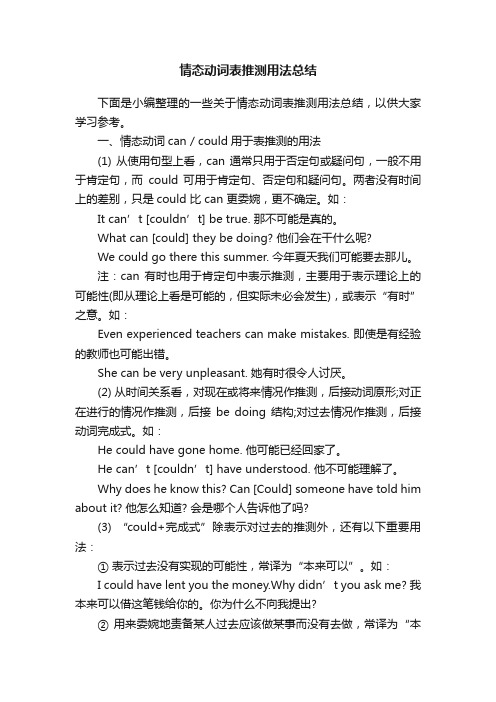
情态动词表推测用法总结下面是小编整理的一些关于情态动词表推测用法总结,以供大家学习参考。
一、情态动词can / could用于表推测的用法(1) 从使用句型上看,can 通常只用于否定句或疑问句,一般不用于肯定句,而could 可用于肯定句、否定句和疑问句。
两者没有时间上的差别,只是could 比 can 更委婉,更不确定。
如:It can’t [couldn’t] be true. 那不可能是真的。
What can [could] they be doing? 他们会在干什么呢?We could go there this summer. 今年夏天我们可能要去那儿。
注:can 有时也用于肯定句中表示推测,主要用于表示理论上的可能性(即从理论上看是可能的,但实际未必会发生),或表示“有时”之意。
如:Even experienced teachers can make mistakes. 即使是有经验的教师也可能出错。
She can be very unpleasant. 她有时很令人讨厌。
(2) 从时间关系看,对现在或将来情况作推测,后接动词原形;对正在进行的情况作推测,后接be doing 结构;对过去情况作推测,后接动词完成式。
如:He could have gone home. 他可能已经回家了。
He can’t [couldn’t] have understood. 他不可能理解了。
Why does he know this? Can [Could] someone have told him about it? 他怎么知道? 会是哪个人告诉他了吗?(3) “could+完成式”除表示对过去的推测外,还有以下重要用法:① 表示过去没有实现的可能性,常译为“本来可以”。
如:I could have lent you the money.Why didn’t you ask me? 我本来可以借这笔钱给你的。
情态动词表推测的用法

情态动词表推测的用法表示推测的情态动词有must, could, may, might, can, should等。
“情态动词+不定式一般式” 表示对现在或将来的推测,“情态动词+不定式进行式”表示对正在进行的动作或事情的推测,“情态动词+不定式完成式”表示对过去的推测。
一、must表示推测的用法must表示推测时,只用于肯定句,表示很大的可能性,意为“一定,准是,必然会”。
其否定形式是can’t/couldn’t (不可能)。
例如:1. You haven’t eaten anything since this morning; you must be hungry.2. That can’t be Mary —she’s in hospital.二、can/could表示推测的用法1. can表示推测时,多用于肯定句和疑问句。
当用于肯定句时,指“有时可能会”,是理论上的可能,其时间意义宽泛不具体。
例如:Even experienced teachers can make mistakes.2. could表示推测时,既可以用于肯定句,又可以用于疑问句。
例如:My book has disappeared. Who could have taken it?3. can’t/couldn’t表示推测时,用于否定句,是语气最强的否定推测,意为“不可能,一定不(是)”。
例如:He can’t/couldn’t have seen her there.4. can/could在疑问句中表示推测时,含有怀疑或疑问的意味,could比can更不确定。
例如:① Can the news be true?② Who can it be?三、may / might表示推测的用法1. may / might表示推测时,用于肯定句,表示无把握的推测,意为“可能,或许”。
(might 比may 更加不肯定,更无把握)。
情态动词表推测的用法
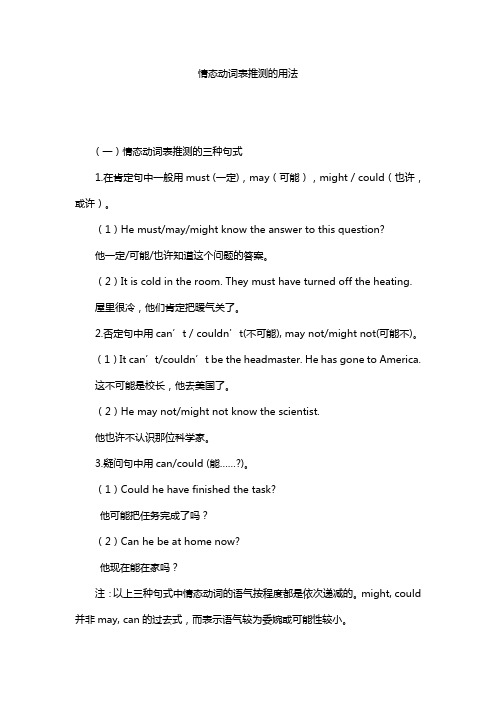
情态动词表推测的用法(一)情态动词表推测的三种句式1.在肯定句中一般用must (一定),may(可能),might / could(也许,或许)。
(1)He must/may/might know the answer to this question?他一定/可能/也许知道这个问题的答案。
(2)It is cold in the room. They must have turned off the heating.屋里很冷,他们肯定把暖气关了。
2.否定句中用can’t / couldn’t(不可能), may not/might not(可能不)。
(1)It can’t/couldn’t be the headmaster. He has gone to America.这不可能是校长,他去美国了。
(2)He may not/might not know the scientist.他也许不认识那位科学家。
3.疑问句中用can/could (能……?)。
(1)Could he have finished the task?他可能把任务完成了吗?(2)Can he be at home now?他现在能在家吗?注:以上三种句式中情态动词的语气按程度都是依次递减的。
might, could 并非may, can的过去式,而表示语气较为委婉或可能性较小。
(二)情态动词表推测的三种时态1.对将来情况的推测,用“情态动词 + 动词原形”。
(1)She must / may / might / could arrive before 5.5:00前她一定/可能/也许到。
(2)She must/may/might/could walk miles and miles among the hills without meeting anyone.她一定/可能/也许会在山里一连走好几英里而遇不到一个人。
2.对现在或一般情况的推测,用“情态动词 + be”,“情态动词 +be doing”或“情态动词 + 动词原形”。
情态动词must, can, could, may, might表推测的用法

情态动词must, can, could, may, might表推测的用法:情态动词中的must, can, could, may, might都表推测。
其中must的可能性最大,can / could次之,may / might最小。
具体用法如下:1. must的用法(1)表示推测“可能性”时,意思是“一定、准是”,语气较肯定,较有把握。
He must be American. = It is certain that he is American. 他准是个美国人。
(2)must表推测只能用于肯定句。
如果要表示“一定不、肯定不”的意思时,应用can`t,如询问某种可能时,应用can。
He must know my address. 他肯定知道我的地址。
(一定)He can`t know my address. 他肯定不知道我的地址。
(一定不)Can he know my address? 他知道我的地址吗?(询问可能性)(3)must表示推测时,可以推测现在/正在发生的动作/过去发生的动作。
He must have a car now. (现在)他一定有辆小汽车。
He must be doing his exercises in the classroom.(正在进行)他一定在教室里做练习。
He must have finished the work.(过去发生)他一定已完成了工作。
注:must表示推测时很少用于将来的情况。
一般不用He must come tomorrow.可用It`s certain / I`m sure that he will come tomorrow. (4)在反意疑问句中,当附属部分含有表示推测意义的must时,疑问部分的助动词应与must后面的动词在非推测情况下的用法保持一致。
He must be a worker, isn`t he? (现在)他准时个工人,是吗?It must have rained last night, didn`t it? (过去)昨晚一定下雨了,是不是?You must have learned English for many years, haven`t you? (完成时)你一定学了好多年英语,是吗?2. can / could的用法(1)can表示推测“可能性”时,往往用于否定句或疑问句。
表推测的情态动词用法小结

表推测的情态动词用法小结英语中有不少情态动词都可以表示推测,其语气有强有弱,表示的可能性有大有小,情态动词表推测时,可能性由弱到强的排列顺序如下:might→may→could→can→should →would→must“现将它们的用法归纳如下:1. 接近100%的可能这当然只有must才具有这么高的可能性,它的意思是“一定”“肯定”,所作出的推测几乎接近事实。
如:That hat must be Tom’s. 那帽子一定是汤姆的。
He must be coming by bus. 他一定是乘公共汽车来。
2. 很有可能表示可能性较大的情态动词主要有may, should, ought to,它们大致相当于汉语的“可能”“应该”“按理会”。
如:She should [ought to] be here soon. 她应该很快就到。
We may be buying a new house. 我们可能要买一座新房子。
3. 一般性的可能在所有表示推测的情态动词中,might和could所表示的可能性最小,由于它们的语气较委婉,较不确定,所以往往相当于汉语的“可能”“也许”“说不定”等。
如:He might be waiting for you. 他可能在等你。
She might not like the idea. 她或许会不赞成这个想法。
We could all be millionaires one day. 我们有一天可能都成为百万富翁。
4. 理论上的可能性表示理论上的可能通常是用can,且可以用于肯定句中。
如:Food poisoning can cause death. 食物中毒可导致死亡。
This kind of thing can happen every now and then. 这种事情是随时可能发生的。
New England can be very hot in September. 新英格兰有时9月份很热。
表推测的情态动词用法小结
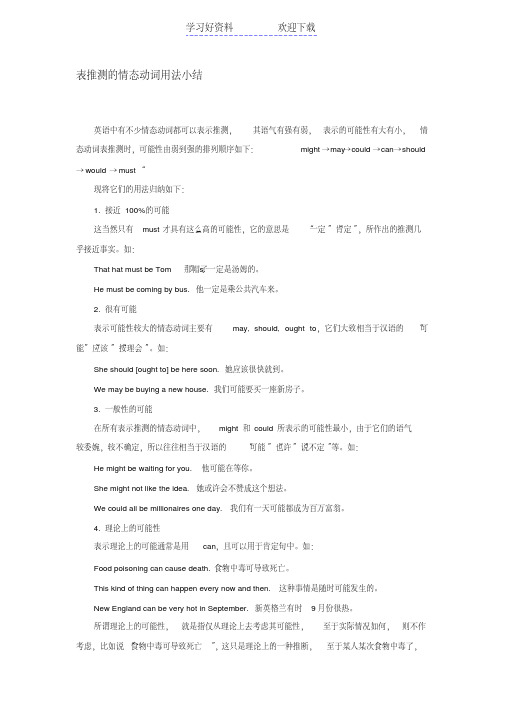
表推测的情态动词用法小结英语中有不少情态动词都可以表示推测,其语气有强有弱,表示的可能性有大有小,情态动词表推测时,可能性由弱到强的排列顺序如下:might→may→could→can→should →would→must“现将它们的用法归纳如下:1. 接近100%的可能这当然只有must才具有这么高的可能性,它的意思是“一定”“肯定”,所作出的推测几乎接近事实。
如:那帽子一定是汤姆的。
That hat must be Tom’s.He must be coming by bus. 他一定是乘公共汽车来。
2. 很有可能表示可能性较大的情态动词主要有may, should, ought to,它们大致相当于汉语的“可能”“应该”“按理会”。
如:She should [ought to] be here soon. 她应该很快就到。
We may be buying a new house. 我们可能要买一座新房子。
3. 一般性的可能在所有表示推测的情态动词中,might和could所表示的可能性最小,由于它们的语气较委婉,较不确定,所以往往相当于汉语的“可能”“也许”“说不定”等。
如:He might be waiting for you. 他可能在等你。
She might not like the idea. 她或许会不赞成这个想法。
We could all be millionaires one day. 我们有一天可能都成为百万富翁。
4. 理论上的可能性表示理论上的可能通常是用can,且可以用于肯定句中。
如:Food poisoning can cause death. 食物中毒可导致死亡。
This kind of thing can happen every now and then. 这种事情是随时可能发生的。
New England can be very hot in September. 新英格兰有时9月份很热。
(完整版)情态动词must、can、could、may、might精解

would :1. 表will的过去,用于过去将来时2. 表"意愿",乐意做某事3. 虚拟语气could: 1. 表can的过去,表过去的能力2 表请求(婉转语气)3. 表猜测:可能是...4. 虚拟语气should: 1. 表shall的过去,用于过去将来时,搭配第一人称2. 表婉转的语气: 应该做...3. 虚拟语气might: 1. may的过去,表猜测:可能是2. 表许可(婉转语气)may: 1. 表猜测: 可能是2. 表许可think of 想起, 想到; 没有think from的用法一.shall和will的用法1、shall 用在第一、三人称,will 用于第二人称表示“征求意见”。
Shall I go now?Shall we invite her, too?Will you help me with the work?Shall the reporters wait outside or what?2、shall表示依据规定有义务去做。
Passengers shall not talk with the driver while the bus is moving.3、shall 用于所有人称,表示说话人的许诺、威胁、警告、命令等。
You shall have an answer by tomorrow.If he’s good, he shall have a new watch for Christma s.If you children don’t do as I tell you, you shan’t go to the party.4、would 可以表示过去的习惯(would 可表示反复发生的动作或某种倾向。
used to表示过去的习惯动作或状态,强调现在已不存在)He would come to see me on Sunday when he was here.The dog would lie there in the sun all afternoon.When we were children, we would go skating every winter.5、will可以表示“愿意”,而非将来:I will pay you for it. 我会付给你钱买下它的。
英语中情态动词表推测的用法
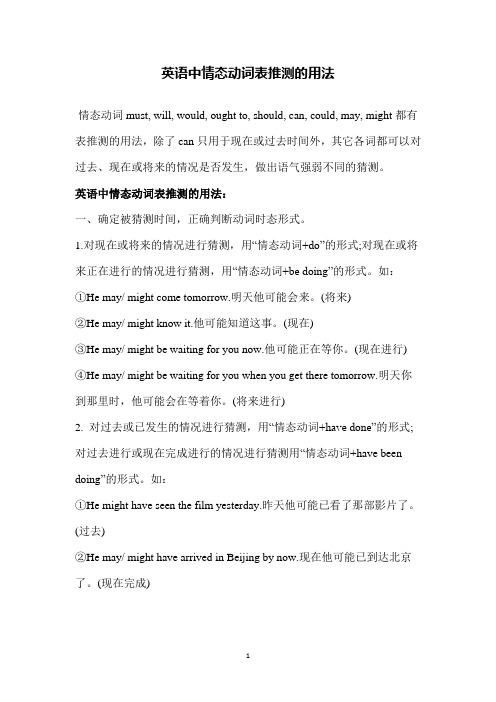
英语中情态动词表推测的用法情态动词must, will, would, ought to, should, can, could, may, might都有表推测的用法,除了can只用于现在或过去时间外,其它各词都可以对过去、现在或将来的情况是否发生,做出语气强弱不同的猜测。
英语中情态动词表推测的用法:一、确定被猜测时间,正确判断动词时态形式。
1.对现在或将来的情况进行猜测,用“情态动词+do”的形式;对现在或将来正在进行的情况进行猜测,用“情态动词+be doing”的形式。
如:①He may/ might come tomorrow.明天他可能会来。
(将来)②He may/ might know it.他可能知道这事。
(现在)③He may/ might be waiting for you now.他可能正在等你。
(现在进行)④He may/ might be waiting for you when you get there tomorrow.明天你到那里时,他可能会在等着你。
(将来进行)2. 对过去或已发生的情况进行猜测,用“情态动词+have done”的形式;对过去进行或现在完成进行的情况进行猜测用“情态动词+have been doing”的形式。
如:①He might have seen the film yesterday.昨天他可能已看了那部影片了。
(过去)②He may/ might have arrived in Beijing by now.现在他可能已到达北京了。
(现在完成)③He might have been waiting for you when you phoned him.你给他打电话时,他可能已在等你了。
(过去完成进行)二、把握猜测语气特点,选择恰当情态动词。
1. 熟记情态动词的语气特点和用法限制。
1)表示肯定的猜测时,各情态动词语气强弱如下:最强——must(一定)will (很有可能)would(很有可能)ought to(应该,很有可能)should(应该,很有可能)can(可能)could(可能)may(可能)最弱——might(可能)2)表示否定的猜测时can't / couldn't语气最强,指“不可能”;may / might not语气最弱,意思是“可能不”。
情态动词表推测的用法小结

情态动词表推测的用法小结(一)情态动词表推测的三种时态1.对将来情况的推测,用“情态动词+ 动词原形”。
(1)She must / may / might / could arrive before 5. 5:00前她一定/可能/也许到2.对现在或一般情况的推测,用“情态动词+ be”,“情态动词+be doing”或“情态动词+ 动词原形”。
(1)He must / may / might / could be listening to the radio now.他一定/可能/也许正在听收音机。
(2)He can’t ( couldn’t ) / may ( might ) not be at home at this time.这个时候他不可能/可能不在家。
3.对过去情况的推测,用“情态动词+ have +过去分词”。
(1)It must / may / might / could have rained last night .The ground is wet.地湿了,昨晚肯定/可能/也许下雨了。
(2)The door was locked. He can ( could ) not / may ( might ) not have been at home .门锁着,他不可能/可能不在家。
注:情态动词should /ought to表推测时,意为“想必会,理应……”但与“have +过去分词”连用时,则又可构成虚拟语气意为“本应该做某事却没做”。
例如:(4)It’s seven o’clock. Jack should/ought to be here at any moment.现在七点钟了,杰克理应随时到达。
(推测)(5)She should / ought to have attended your birthday party, but she had to look after her mother in hospital. (虚拟)她本该出席你的生日晚会的,可是她得在医院照顾她妈妈。
初二下情态动词用法
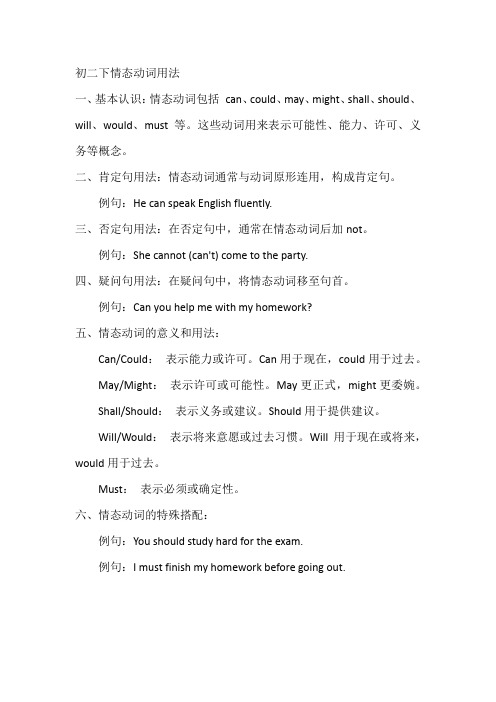
初二下情态动词用法
一、基本认识:情态动词包括can、could、may、might、shall、should、will、would、must等。
这些动词用来表示可能性、能力、许可、义务等概念。
二、肯定句用法:情态动词通常与动词原形连用,构成肯定句。
例句:He can speak English fluently.
三、否定句用法:在否定句中,通常在情态动词后加not。
例句:She cannot (can't) come to the party.
四、疑问句用法:在疑问句中,将情态动词移至句首。
例句:Can you help me with my homework?
五、情态动词的意义和用法:
Can/Could:表示能力或许可。
Can用于现在,could用于过去。
May/Might:表示许可或可能性。
May更正式,might更委婉。
Shall/Should:表示义务或建议。
Should用于提供建议。
Will/Would:表示将来意愿或过去习惯。
Will用于现在或将来,would用于过去。
Must:表示必须或确定性。
六、情态动词的特殊搭配:
例句:You should study hard for the exam.
例句:I must finish my homework before going out.。
情态动词及用法
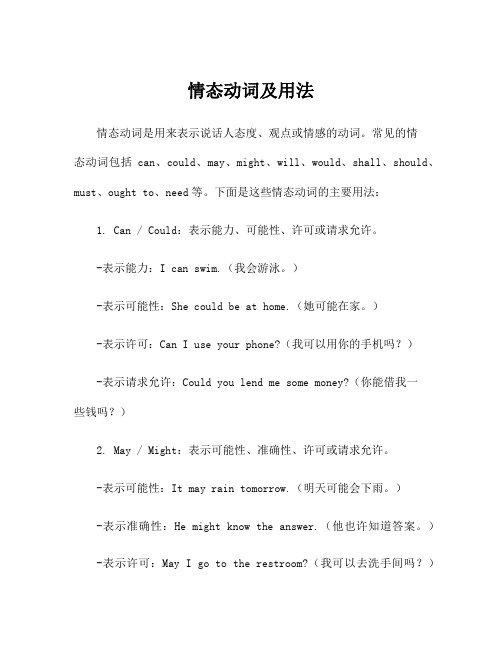
情态动词及用法情态动词是用来表示说话人态度、观点或情感的动词。
常见的情态动词包括can、could、may、might、will、would、shall、should、must、ought to、need等。
下面是这些情态动词的主要用法:1. Can / Could:表示能力、可能性、许可或请求允许。
-表示能力:I can swim.(我会游泳。
)-表示可能性:She could be at home.(她可能在家。
)-表示许可:Can I use your phone?(我可以用你的手机吗?)-表示请求允许:Could you lend me some money?(你能借我一些钱吗?)2. May / Might:表示可能性、准确性、许可或请求允许。
-表示可能性:It may rain tomorrow.(明天可能会下雨。
)-表示准确性:He might know the answer.(他也许知道答案。
)-表示许可:May I go to the restroom?(我可以去洗手间吗?)-表示请求允许:Might I borrow your pen?(我可以借用你的笔吗?)3. Will / Would:表示意愿、习惯、请求、承诺或预测。
-表示意愿:I will help you.(我愿意帮助你。
)-表示习惯:She would always go for a walk after dinner.(她习惯饭后散步。
)-表示请求:Would you please close the door?(请你关上门好吗?)-表示承诺:I would do my best to finish the project.(我会尽力完成这个项目。
)-表示预测:It will rain tomorrow.(明天将会下雨。
)4. Shall / Should:表示建议、命令、义务或预测。
-表示建议:You should exercise regularly.(你应该经常运动。
情态动词must。can。could。may。might表推测的用法

情态动词must。
can。
could。
may。
might表推测的用法情态动词can / could表示推测时,意思是“可能、有可能”,语气比must弱。
XXX用于现在和将来,could用于过去。
1)表示可能性时,can / could后面接动词原形。
He canbe American。
= It is possible that he is American.他可能是个美国人。
2)表示不可能性时,用XXX。
He can`t be American。
=It is impossible that he is American.他不可能是个美国人。
3)can / could还可以表示“会、能够”的意思。
He can speak Chinese.他会说中文。
4)在疑问句中,XXX表示请求、允许、建议等意义。
Can you help me?你能帮我吗?Could you please pass me the salt?你能把盐递给我吗?3.may / might的用法1)may / might表示推测时,意思是“可能性很小”,语气比can / could更弱。
He may be American。
= It is possible thathe is American。
but the possibility is small.他可能是个美国人,但可能性很小。
2)may / might还可以表示请求、许可、建议等意义。
May I use your phone?我可以用你的电话吗?Might I suggest a different approach?我可以建议一种不同的方法吗?3)在虚拟语气中,XXX表示“可能性很小,甚至不可能”,表示一种假设的情况。
If I had studied harder。
I might have passed the exam.如果我学得更努力,我可能会通过考试。
总之,情态动词must。
情态动词表推测的用法小结
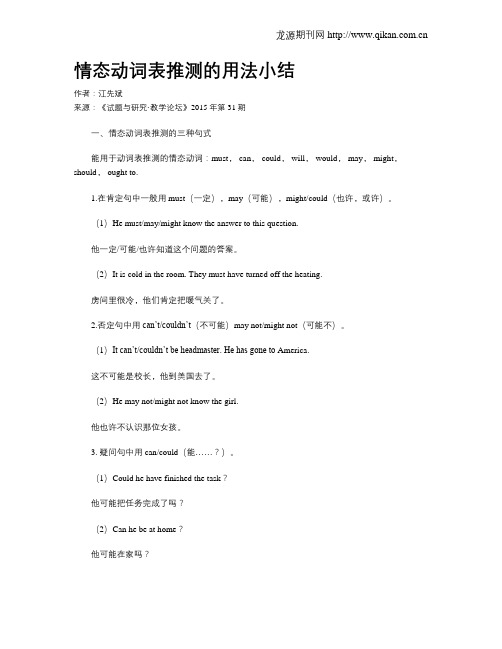
情态动词表推测的用法小结作者:江先斌来源:《试题与研究·教学论坛》2015年第31期一、情态动词表推测的三种句式能用于动词表推测的情态动词:must, can, could, will, would, may, might,should, ought to.1.在肯定句中一般用must(一定),may(可能),might/could(也许,或许)。
(1)He must/may/might know the answer to this question.他一定/可能/也许知道这个问题的答案。
(2)It is cold in the room. They must have turned off the heating.房间里很冷,他们肯定把暖气关了。
2.否定句中用can’t/couldn’t(不可能)may not/might not(可能不)。
(1)It can’t/couldn’t be headmaster. He has gone to America.这不可能是校长,他到美国去了。
(2)He may not/might not know the girl.他也许不认识那位女孩。
3. 疑问句中用can/could(能……?)。
(1)Could he have finished the task?他可能把任务完成了吗?(2)Can he be at home?他可能在家吗?注:以上三种句式中情态动词的语气按程度都是依次递减的。
might, could并非may,can的过去式,表示语气较为委婉或可能性较小。
二、情态动词表推测的三种时态1.对将来情况的推测,用“情态动词+动词原形”。
(1)She must/may/might/could arrive before three.三点前她一定/可能/也许到。
(2)She must/may/might/could know the answers.她一定/可能/也许知道答案。
情态动词表推测的口诀

情态动词表推测的口诀在日常生活中,我们常常需要用英语进行推测,此时就需要借助情态动词。
情态动词在表示推测时,有较强的语气助词作用,能表达说话者对某件事情的猜测或推测。
下面我们将学习一些常用的推测性情态动词及其用法。
一、推测性情态动词的分类和含义1.肯定推测:can、could、may、might、must、should等。
2.否定推测:can"t、couldn"t、may not、might not、mustn"t、shouldn"t等。
二、情态动词表推测的口诀1.肯定推测:can、could、may、might、must、should口诀:肯定推测用yes,can、could、may、might、must、should解忧愁。
2.否定推测:can"t、couldn"t、may not、might not、mustn"t、shouldn"t口诀:否定推测别慌张,can"t、couldn"t、may not、might not、mustn"t、shouldn"t来帮忙。
三、实例分析与应用1.肯定推测例句:He can be the one who saved her.他可能是救她那个人。
You might know the answer.你可能知道答案。
2.否定推测例句:She can"t have done that.她不可能做过那件事。
He shouldn"t be late.他不应该迟到。
掌握这些推测性情态动词,并在实际交流中灵活运用,能帮助我们更准确地表达猜测和推测。
情态动词mustcancouldmaymight表推测的用法

情态动词must--can--could--may--might表推测的用法————————————————————————————————作者: ————————————————————————————————日期:ﻩ情态动词must,can, could,may, might表推测的用法:情态动词中的must, can, could, may, might都表推测。
其中must的可能性最大,can / could次之,may / might最小。
具体用法如下: 1. must的用法ﻫ(1)表示推测“可能性”时,意思是“一定、准是”,语气较肯定,较有把握。
He mustbe American. =It is certain that he is Ameri can.他准是个美国人。
(2)must表推测只能用于肯定句。
如果要表示“一定不、肯定不”的意思时,应用can`t,如询问某种可能时,应用can。
He must knowmy address. 他肯定知道我的地址。
(一定)ﻫHe ca n`tknow my address.他肯定不知道我的地址。
(一定不)Can he know my address? 他知道我的地址吗?(询问可能性)ﻫ(3)must 表示推测时,可以推测现在/正在发生的动作/过去发生的动作。
ﻫHe musthave a car now. (现在)他一定有辆小汽车。
He must be doing his exercisesinthe classroom.(正在进行)他一定在教室里做练习。
ﻫHe must have finished the work.(过去发生)他一定已完成了工作。
ﻫ注:must表示推测时很少用于将来的情况。
一般不用He must come tomorrow.可用It`scer tain / I`m sure that he will come tomorrow.ﻫ(4)在反意疑问句中,当附属部分含有表示推测意义的must时,疑问部分的助动词应与must后面的动词在非推测情况下的用法保持一致。
- 1、下载文档前请自行甄别文档内容的完整性,平台不提供额外的编辑、内容补充、找答案等附加服务。
- 2、"仅部分预览"的文档,不可在线预览部分如存在完整性等问题,可反馈申请退款(可完整预览的文档不适用该条件!)。
- 3、如文档侵犯您的权益,请联系客服反馈,我们会尽快为您处理(人工客服工作时间:9:00-18:30)。
情态动词must, can, could, may,might表推测的用法:情态动词中的must, can, could, may, might都表推测。
其中must的可能性最大,can / could次之,may / might最小。
具体用法如下:1. must的用法(1)表示推测“可能性”时,意思是“一定、准是”,语气较肯定,较有把握。
He must be American. = It is certain that he is American. 他准是个美国人。
(2)must表推测只能用于肯定句。
如果要表示“一定不、肯定不”的意思时,应用can`t,如询问某种可能时,应用can。
He must know my address. 他肯定知道我的地址。
(一定)He can`t know my address. 他肯定不知道我的地址。
(一定不)Can he know my address? 他知道我的地址吗?(询问可能性)(3)must表示推测时,可以推测现在/正在发生的动作/过去发生的动作。
He must have a car now. (现在)他一定有辆小汽车。
He must be doing his exercises in the classroom.(正在进行)他一定在教室里做练习。
He must have finished the work.(过去发生)他一定已完成了工作。
注:must表示推测时很少用于将来的情况。
一般不用He must come tomorrow.可用It`s certain / I`m sure that he will come tomorrow.(4)在反意疑问句中,当附属部分含有表示推测意义的must时,疑问部分的助动词应与must后面的动词在非推测情况下的用法保持一致。
He must be a worker, isn`t he? (现在)他准时个工人,是吗?It must have rained last night, didn`t it? (过去)昨晚一定下雨了,是不是?You must have learned English for many years, haven`t you? (完成时)你一定学了好多年英语,是吗?2. can / could的用法(1)can表示推测“可能性”时,往往用于否定句或疑问句。
Can`t“一定不”,语气很肯定。
can在疑问句中意思是“会、可能”。
He can`t be at home. = It is impossible that he is at home. 他一定不在家。
(2)can /can`t后可接进行时/完成时,表示对现在发生的动作或过去发生的动作进行推测。
They can`t be reading in the library. 他们一定不在图书馆读书。
He can`t have gone to Shanghai for I saw him a minute ago.他不可能去了上海,我刚才还看见他。
It`s so late. Where can she have gone? 天晚了,她可能去哪儿了呢?(3)在反意疑问句中,当陈述部分含有表示推测意义的can`t时,疑问部分的助动词应与can`t后面的动词在非推测情况下的用法保持一致.He can`t be a teacher, is he? 他不是教师,是吗?She can`t have finished her homework, has she?她一定没有完成家庭作业,是不是?(4)could可用于表示某事有可能发生或可能是事实。
Don`t eat it. It could be poisonous. 不要吃它,可能有毒。
The plane could be delayed by fog. 飞机可能会因为雾晚点。
(5)could还可以用于表示客气、委婉、礼貌的请求语气。
Excuse me, could you tell me the way to the bus station?Could you help me?(6)couldn`t表示否定推测,表示某事不可能真实,或由于特定事实或环境某事肯定不会发生。
It couldn`t possibly be poison. 这不可能是毒药。
注:有时与形容词的比较级连用强调某人或某物不可能再更多地具有某种属性。
You couldn`t be more wrong. 你真是大错特错。
I couldn`t be happier. 我简直是幸福极了。
3. may和might的用法(1) may, might表示推测“可能性”时,意思是“可能”、“也许”,语气没有must肯定。
He may / might be American. = It is possible that he is American.他可能是个美国人。
注:might不表示过去时态,只是语气上比may更委婉,表示的可能性更小。
(2)may, might表推测时,可以用于否定句,意思是“可能不、也许不”,但不用于疑问句。
He may / might not be at home. 他也许不在家。
(3)may, might可以推测现在正在发生的动作或过去发生的动作。
He may / might be sleeping now. (现在)他可能正在睡觉。
The boy may / might not be watching TV at home. (现在)这个男孩可能没在家看电视These students may / might have seen the film before.(过去)这些学生以前可能看过这部电影。
(4)may, might还可以推测将来的情况。
I think we should take raincoat with us, it may rain.我想我们应该带上雨衣,可能要下雨了。
She might not come this afternoon. 她今天下午可能不来了。
情态动词和虚拟语气练习40题从A、B、C、D四个选项中,选出可以填入空白处的最佳选项。
1.—Are you in a hurry?—No,in fact I’ve got plenty of time. I ___wait.A.mustB.needC.mayD.should2.—Someone is knocking at the door. ___ it be Venis?—No,it ___ be her;she left for New York this morning.A.Can;mustn’tB.Might;can’tC.May;doesn’tD.Can;can’t3.He didn’t agree with me at first,but I ____ persuade him to sign the agreement later.A.couldB.mightC.shouldD.was able to4.—Is there a movie on in the cinema tonight?—There___ be. I will phone the cinema and find it out.A.mightB.shouldC.canD.could5.You ___ be careful when you cross here —the traffic lights aren’t working.A.canB.ought toC.mightD.may6.You ___ out last night. I called you several times,but nobody answered.A.must have beenB.must beC.might have beenD.could be7.You ___ fail to pass the entrance examination if you don’t study harder.A.shallB.couldC.mustD.should8.When I was studying at Beijing University,I ___ take a walk along the lake every evening.A.willB.wouldC.couldD.shall9.The party turned out to be a failure. I would rather ___ it.A.not have attendedB.not attendC.not to attendD.not to have attended10.Sir,you ___ be sitting in this seat. It is for women or children only.A.can’tB.oughtn’t toC.won’tD.needn’t11.—Shall I tell Li Ming about the matter?—No,you ___ . He has known about it already.A.oughtn’t toB.needn’tC.shouldn’tD.mustn’t12.—Must I take a bus?—No,you ___ . You can walk there.A.must notB.don’tC.don’t have toD.had better not to13.—Why do you make me do so?—I am sorry that you ___ do such a thing.A.wouldB.canC.shouldD.may14.—Will you stay for lunch?—Sorry,I ___ . My brother is coming to see me.A.mustn’tB.can’tC.needn’tD.won’t15.What would have happened ___ ,as far as the riverbank?A.if Bob has walked fartherB.if Bob should walk fartherC.had Bob walked fartherD.should Bob walk farther16.Oh,Jane,you’v e broken another glass. You ought ___ when you washed it.A.be carefulB.to careC.have caredD.to have been careful17.It’s high time we ___ to th e theater.A.will goB.shall goC.are going toD.went18.—Could I use your telephone?—Yes,of course you ___ .A.couldB.willC.canD.might19.It’s strange that they ___ nothing about this matte r.A.should knowB.would knowC.had knownD.knew20.—Do you still remember the day when we went to the Great Wall?—I can’t remember it well,but ___ sometime last autumn?A.might it beB.could it have beenC.could it beD.must it have been21.—I can’t get through to the general manager’s office anyhow.—The line is busy. Someone ___ the telephone.A.must useesC.must have been usingD.must be using22.He suggests we ___ to the cinema at once,otherwise we will be late.A.must goB.goC.will goD.would go23.If only he ___ me yesterday!A.had seenB.would seeC.should seeD.saw24.If you ___ wait a moment,I’ll go and find our manager.A.canB.shouldC.willD.must25.—It is rather cold here. Shall we light a fire?—No,we ___ because things are easy to catch fire.A.won’tB.can’tC.mustn’tD.needn’t26.If I ___ you,I ___ more attention to English idioms and phrases.A.was;shall payB.am;will payC.would be;would payD.were;would pay27.—Would you have told him the answer had it been possible?—I would have,but I ___ so busy then.A.had beenB.wereC.wasD.would be28.—Can children swim in this pool?—Yes. However,at no time ___ they do so by themselves.A.dareB.shouldC.needD.could29.Kunming is called“Spring City”,but it ___ snow in winter.A.shallB.canC.mustD.might30.—What’s the matter with you?—Oh,I’m not feeling well in the stomach. I ___ so much fried fish just now.A.shouldn’t eatB.mustn’t have eatenC.shou ldn’t have eatenD.mustn’t eat31.—You look so upset. What’s wrong with you?—The door ___ . Can you help me?A.won’t openB.won’t be openedC.can’t openD.can’t be opened32.—Mum,I climbed to get the Teddy Bear from the top of the shelf.—My goodness!You ___ yourself. You mustn’t do that next time.A.must have hurtB.should have hurtC.may have hurtD.can have hurt33.Children under 12 years of age in that country ___ be under adult supervision when he is in a public library.A.mustB.mayC.canD.need34.“The interest ___ be divided into five parts,according to the agreement made by both sides,” declared the judge.A.mayB.shouldC.mustD.shall35.—I don’t mind telling you what I know.—You ___ . I’m not asking you for it.A.mustn’tB.may notC.can’tD.needn’t36.—Mum,I’ve been studying English since 8 o’clock. ___ I go out and play with Tom for a while?—No,I’m afraid not. Besides,it’s raining outside now.A.Can’tB.Wouldn’tC.Dare notD.Won’t37.—Who is the girl standing over there?—Well,if you ___ know,her name is Mabel.A.mayB.canC.must D shall38.The driver has drunk too much wine and dangerous things ___ happen at any time.A.shouldB.canC.mustD.need39.We ___ booked. Look,this restaurant is almost empty.A.must haveB.can’t haveC.should haveD.needn’t have40.Listen! The fire engine is roaring. There ___ be a fire somewhere.A.shouldB.mustC.willD.ought to【答案及部分解析】1~5 CDDAB 6~10 AABAB 11~15BCCBC 16~20 DDCAB 21~25 DBACC 26~30 DCBBC 31~35 ACADD 36~40 ACADB1. may表示“可以”。
